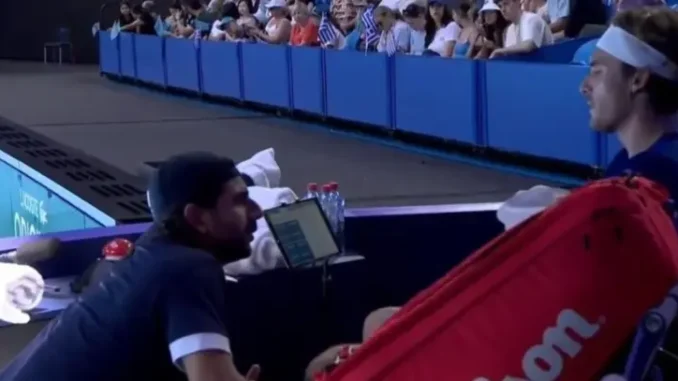
Stefanos Tsitsipas found himself at the center of attention for all the wrong reasons during a stunning loss at the United Cup, a mixed-gender team competition that has quickly become a popular feature in the tennis calendar. The Greek star, known for his fiery on-court demeanor, let his frustrations boil over as he dropped an expletive-laden rant about his backhand, shocking fans and overshadowing his performance. The incident, while drawing headlines, also highlighted the mental and emotional toll high-stakes matches can take on players, even those as seasoned as Tsitsipas.
The match was anticipated to be a straightforward victory for Tsitsipas, who entered as the favorite. His opponent, a lower-ranked player from the rival team, seemed outmatched on paper. However, as the match progressed, it became clear that Tsitsipas was not in his best form. His usually reliable serve faltered at critical moments, and his backhand—often a point of criticism in his otherwise well-rounded game—became a glaring weakness that his opponent exploited mercilessly.
The Greek star’s frustration began to surface midway through the match. After missing several backhand shots in quick succession, Tsitsipas could be seen shaking his head and muttering under his breath. What started as quiet self-criticism soon escalated into a full-blown outburst. During a changeover, cameras captured him venting to his team, using colorful language to express his dissatisfaction with his backhand, a shot he blamed for his unraveling performance. The tirade included a mix of anger and self-deprecation, with Tsitsipas lamenting what he perceived as a fundamental flaw in his game.
The outburst was met with mixed reactions. On one hand, it was a stark reminder of the intense pressure players face in team competitions, where their performance impacts not just their individual record but also their team’s chances of success. On the other hand, some critics argued that such behavior was unprofessional and unbecoming of a player of Tsitsipas’s stature. Social media was abuzz with reactions, with fans debating whether the Greek star’s meltdown was understandable or a sign of immaturity.
The incident also brought renewed focus to Tsitsipas’s backhand, a shot that has often been scrutinized by analysts and commentators. While his forehand is considered one of the most potent weapons in the game, his one-handed backhand has occasionally been a liability, particularly against players who can consistently target it with heavy topspin or powerful cross-court shots. In this match, his opponent repeatedly directed balls to his backhand side, forcing errors and creating opportunities to dictate play. The tactic proved highly effective, leaving Tsitsipas visibly frustrated and struggling to find solutions.
Despite the drama, Tsitsipas managed to push the match to a deciding set, showcasing his resilience and fighting spirit. However, the momentum had already shifted firmly in favor of his opponent, who capitalized on the Greek star’s erratic play to seal the upset victory. The loss was a significant blow to Tsitsipas and the Greek team, who had entered the tournament with high expectations.
After the match, Tsitsipas addressed the media, acknowledging his frustration and expressing regret over his choice of words. He admitted that his emotions got the better of him, attributing his outburst to the high stakes of the match and his deep desire to perform well for his team and country. “It wasn’t my proudest moment,” he said, “but sometimes the passion and frustration come out in ways that aren’t ideal. I’ll learn from this and try to handle those moments better in the future.”
His response was seen by many as a step in the right direction, reflecting a level of self-awareness and accountability that fans appreciated. However, others felt that his repeated emotional outbursts in high-pressure situations point to a broader issue that he needs to address if he hopes to reach the pinnacle of the sport. While his talent and potential are undeniable, moments like these serve as reminders that mental strength and composure are just as critical as technical skill in achieving consistent success.
The loss and subsequent meltdown could serve as a turning point for Tsitsipas as he looks to refine his game and approach to competition. For years, he has been touted as one of the brightest talents in the sport, with the tools to challenge the likes of Novak Djokovic, Carlos Alcaraz, and Daniil Medvedev for major titles. However, inconsistency and emotional volatility have often hindered his progress, leaving fans and experts wondering when he will fully realize his potential.
In the days following the match, the tennis world continued to debate the incident, with some former players and coaches weighing in on Tsitsipas’s game. Many agreed that while his backhand has its limitations, it is not an insurmountable weakness. With proper adjustments, such as improving his positioning and shot selection, he could turn it into a more reliable weapon. Others emphasized the importance of mental conditioning, suggesting that working with a sports psychologist could help him manage his emotions more effectively during matches.
For Tsitsipas, the road ahead is both challenging and full of opportunity. The United Cup loss, though disappointing, provides valuable lessons that could spur growth and development. As he prepares for the next tournaments, fans will be watching closely to see how he responds to this setback. Will he use the experience as motivation to elevate his game, or will the frustrations continue to linger and hold him back?
Regardless of the outcome, one thing is certain: Tsitsipas remains one of the most compelling figures in tennis. His passion, talent, and willingness to wear his heart on his sleeve make him a fan favorite and a player worth watching. While moments like his United Cup outburst may draw criticism, they also highlight the human side of a sport that demands so much from its athletes. For Tsitsipas, the challenge now is to channel that passion into constructive growth and take the next step toward realizing his full potential.
Leave a Reply